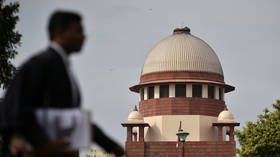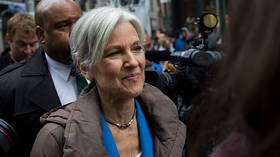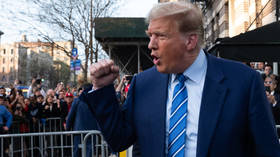Revive economic ties with Pakistan – Indian parliamentary panel to government

A parliamentary panel in India has urged Prime Minister Narendra Modi’s government to consider reviving economic ties with Pakistan. The proposal was part of a report on New Delhi’s “Neighborhood First” policy, aiming to build cordial relations with countries India shares border with, tabled in both houses of the Indian parliament on Tuesday.
The report urged the government “to consider the establishment of economic ties with Pakistan if they come forward and work towards broader people-to-people contacts in view of the cultural commonalities and civilizational linkages between our two countries, and no feeling of enmity amongst citizens of both the countries.” The document was drafted by a parliamentary standing committee on external affairs, consisting of 31 members cutting across party lines.
The latest data shows that despite frosty ties, India-Pakistan trade stood at $1.35 billion in the April-December period of 2022, up from $516 million in the entire 2021. Before bilateral trade was officially suspended in 2019, India’s exports to Pakistan stood at $2.06 billion, while imports were valued at $490 million.
The 2019 trade suspension was announced by the government of Pakistan’s then-prime minister Imran Khan after India abrogated Article 370 of its constitution and revoked special status for Jammu and Kashmir, which Islamabad views as an integral part of its territory.
Back in 2008, bilateral ties between the nuclear-armed nations had nose-dived after deadly attacks on India’s financial hub Mumbai by Laskar-a-Toiba, a Pakistani Islamic militant group, which claimed over 160 lives and left many more injured. However, the countries saw a partial revival in relations in 2014 when Nawaz Sharif, the Pakistan prime minister at the time, attended Modi’s swearing-in ceremony in New Delhi.
Hopes for a rapprochement were also boosted the following year, on the back of national security advisor-level talks in Bangkok, Thailand, Indian foreign minister Sushma Swaraj’s visit to Pakistan, and Prime Minister Modi’s surprise stopover in Lahore on Sharif’s birthday on December 25. However, following Pakistan’s series of cross-border strikes between 2016 and 2019, amid a spike in homegrown extremist activities in Jammu and Kashmir, allegedly aided by Islamabad and its 'non-state actors,' relations deteriorated.
On February 26, 2019 India retaliated to the terror attacks with an air strike on Balakot – the alleged site of the biggest training camp of Jaish-e-Mohammed, an Islamist militant group waging a bloody separatist war in Jammu and Kashmir – and months later the Khan administration downgraded ties.
The Indian parliamentary committee took note of Islamabad’s subversive activities as an obstacle to restoring of normal bilateral ties, and urged the government to “sensitize Pakistan in its fight against terrorism on its soil” by involving multilateral agencies and organizations.
The Indian Foreign Ministry spokesman on Thursday refused to comment on the panel’s recommendations, saying the ministry will follow due process and formally convey its position to parliament. New Delhi’s stance on relations with Islamabad “is well known,” he added.
Besides Pakistan, the panel also urged the government to resolve the Teesta water-sharing issue with Bangladesh, which has been pending since 2011, and to raise the issue of repatriating illegal migrants from Myanmar.













